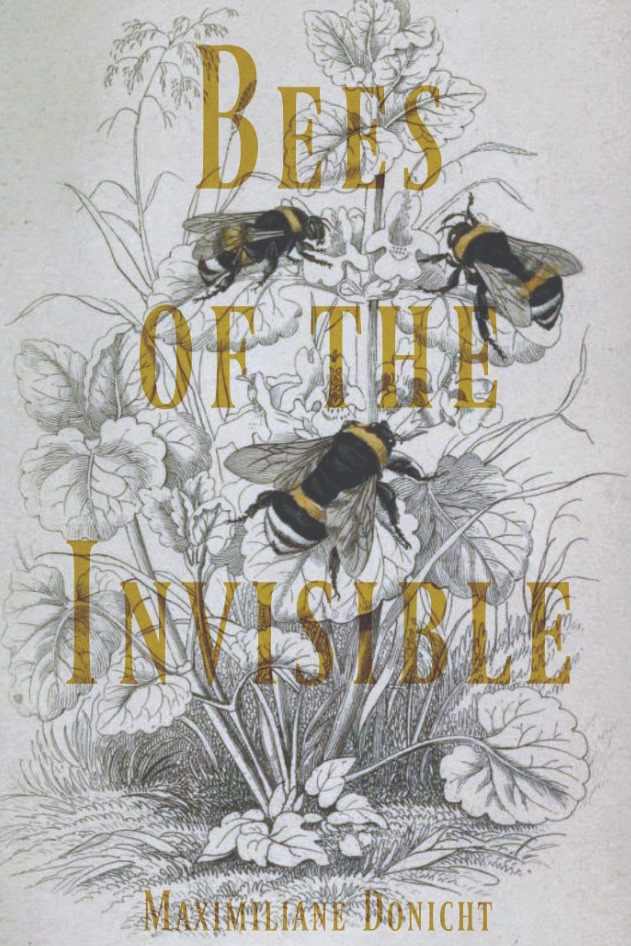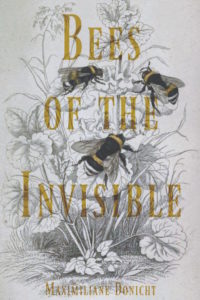

At the start of the twentieth century, German-language poet Rainer Maria Rilke penned over the course of ten years what are now considered his most famous poems, the Duino Elegies. They tackled questions of temporality, human existence, and the relationship between life and death through studies of the spiritual and natural world. “It is our task,” Rilke wrote in a letter to his Polish translator in 1925, “to imprint this temporary, perishable earth into ourselves so deeply, so painfully and passionately, that its essence can rise again “invisibly,” inside us. We are the bees of the invisible. We wildly collect the honey of the visible, to store it in the great golden hive of the invisible.”
One hundred years later, German-born poet Maximiliane Donicht picks up where Rilke left off, weaving her own expressive, elegiac verses. In her debut chapbook, Bees of the Invisible, Donicht explores Rilke’s theory of “The Open” through her own meditations on the natural world, the metaphysical world, and what lies between. Esteemed poet Jeffrey Greene writes, “The title of this remarkable collection of poems, Bees of the Invisible, aptly captures Maximiliane Donicht’s method of binding natural observation to a mystic form of consciousness. Bees, birds, animals, stars, ceremonies, quantum physics, and personal memories buzz as one.”
Indeed, one of the gifts of this collection is that it allows for apparent opposites to come into conversation with each other and even coexist seamlessly. Donicht’s rumination on the traditionally opposing forces of nature and man begins in the very first poem, “Wolpertinger,” which is named for a mythical Bavarian hybrid forest creature. The tension is set up between nature and the hunter as the wolpertinger describes:
…………….I balance
…………….on the bottleneck
……..of being
……..barely sit in the blurry skirts
of apricity, in the red braids
of root.
In this poem, Donicht manages to not only capture the man-made and the natural worlds, but also their commonality. This endeavor to merge worlds is echoed in many poems throughout the collection, including “A Flamboyance” (after Rilke’s poetic study of flamingos), which describes man-made flamingoes as symbols of colliding mythical and commercial spheres that inhabit the poem symbiotically. In the beginning of the poem, she writes, “…billions congregate on front lawns / and flower beds, arching halogen necks,” (a decidedly man-made occurrence) while later describing the flamingos’ beaks as “black brushes dipped in the imaginary.” The scientific precision of Donicht’s structuring – for example, the flowing indentation of lines on the page – ensure that the poem is not disjointed, but cohesive. Reading Donicht’s poems is like watching opposite magnetic poles with their own separate magnetic fields click together to form one unified field.
Another pair of conceptual opposites that Donicht merges: the simultaneously endless and finite natures of time. Many of her poems have an ethereal timelessness (aided by shifting tenses) while still incorporating images evoking delineated time. In “Totenbaum” – a title recalling the image of tree trunk coffin hollowed out from a single log – she observes:
how reckless I was to think
time was linear when everything,
even the smallest apparatus
turns.
One of the more remarkable aspects of the collection is Donicht’s ability to bring philosophical and scientific concepts together with mythological creatures and spirits, without allowing her language to become lost in abstraction. In “Blackbird on Wood,” for example, a bird flying into a school building window becomes the inciting incident to explore questions of evolutionary, history contributing to the concepts of time and self. And, at every turn, her philosophical reflections remain tethered to the tangible. This can also be seen in one of the shortest poems in the collection, “Grazing Lunar Occultation,” which serves as a nexus for many of the collection’s themes:
I return to the center of everything
somewhat less magnetic; burnt bulb
now, orbit without sun
and only the bees know where
I have been, what I have undone
Donicht’s language melds images of nature and man-made objects, so they are intertwined as one, as she sets up a circular framework for her poetry to inhabit, instead of a spectrum with polarized ends. By invoking Rilke’s bees toward the end of her collection, she also recalls her search for a more complete understanding of Rilke’s metaphysical concepts.
Like Rilke, Donicht has called many places home and is exceptionally multilingual (she speaks German, English, French, and Japanese); perhaps as a result, her collection evokes at once an ethereal anywhere-ness and a strong sense of setting. One such example is her poem “Numen,” named for a spirit that presides over place. Occasionally, Donicht’s poems take on very concrete settings, such as a New York City museum, or a school classroom, but most often, her poems are rich in setting details without a specified location (such as wings that “knit a black shawl in the sky, / blotting out the cathedral”), allowing for a magical reading experience wherein the place feels simultaneously familiar and real, but also magical – potentially anywhere and everywhere.
There is much thematic overlap between Donicht’s work and the Rilke poems her collection centers around: birding images, musings on the relationship between life and death, and remnants of classicism, to name a few. Yet, Donicht’s style diverges from Rilke’s; hers takes the relentless rhetorical questions and dramatic grandiosity of Rilke’s elegies and funnels them into a quieter, more meditative tone. The result is a stunning collection of accessible and profound ruminations on humanity and nature, life and death, the infinite and the finite, and the space in which all these ideas converge. With her words, Donicht builds a peaceful world in which to meditate on the oneness of seemingly contradictory ideas.
In 1925, toward the end of his life, Rilke wrote, “Death is the side of life that is turned away from us and not illuminated… there is neither a this-world or an other-world, but only the great unity.” In this masterful work, Donicht’s beautifully fuses once separate worlds into a unity that is sure to imprint deeply upon its reader.
Reviewed by Shoshana Akabas, Columbia University
Bees of the Invisible
by Maximiliane Donicht
Publisher: Finishing Line Press
Paperback / 44 pages / 2018
ISBN: 9781635346251
To read more book reviews click here.
Published on October 2, 2018.




